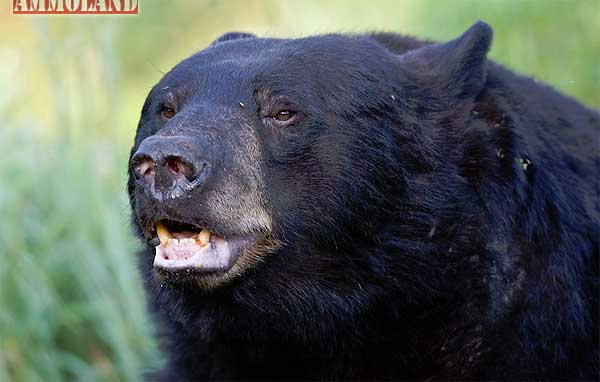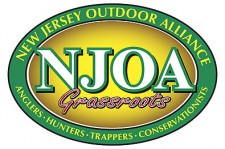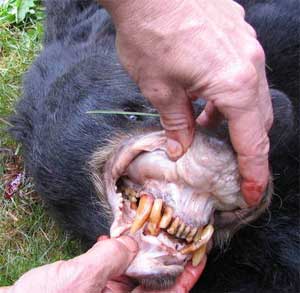

TRENTON, NJ –-(Ammoland.com)- For years animal rights extremists have been telling the public that there has never been a human fatality caused by a black bear in New Jersey.
This was a specious claim with the intention of fooling the public into thinking that black bears never attack humans.
In fact, as has been reported by New Jersey Outdoor Alliance ( NJOA ) in the past, there have been approximately 60 human fatalities caused by black bears in North America during the last 100 years.
Today, in the face of a fatality caused by a black bear in New Jersey, animal extremists continue to avoid meaningful steps to ensure public safety by distorting facts and disguising the true nature of a challenge that faces us: responsibly managing the safe keeping of both humans and black bears.
In short, if population growth of both humans and/or black bears is the crux of the problem, then addressing population growth/territory expansion must be part of the solution. Given that human population growth and land development are not something New Jerseyeans are ready to sacrifice, then controlling the population/territory of black bears by using science-based game management methods (managed hunting) is a meaningful solution.
NJOA has been informed that the large acreage on which the fatality occured does not allow bear hunting. Additionally, the area surrounding the acreage is not hunter-friendly.
A tragedy should be used as an opportunity to examine the nature of the cause and also as an opportunity to enact steps that eliminate recurrence – especially when human life and the welfare of wildlife are at risk. In the wake of the recent fatality it is unconscionable for animal rights lobbying groups to continue to selectively extract information from studies and cobble them together with the end result used to confuse the public and avoid an honest solution to a difficult challenge faced by humans and black bears – safe and mutual coexistence.
As conservationists we understand that we are a link in our environment, as is every other living thing.
We understand that the key to the survival of all living things is the formula used by nature that has continued life on earth for the past 4 billion years: the sustainable use of natural resources. The “sustainable use of natural resources” is what defines us as conservationists, and our commitment to being environmental stewards is the enactment of this timeless formula; whether we fish, hunt, trap, or simply appreciate the outdoors.

Again, managing population growth and/or expansion of black bears is the challenge faced by New Jerseyeans and managed hunting will help provide a meaningful solution. There is no need for public hysteria or an over-reaction to the recent fatality. We need to be honest about examining the cause and also be honest about providing effective and responsible solutions.
There are ways to minimize human/black bear encounters and conflicts. Below is advice from the Division of Fish and Wildlife:
Dave Chanda, director of the State Division of Fish and Wildlife. “… We urge people to be cautious when encountering bears, but there is no need for alarm.’’
You can reduce the risk of interactions with bears by taking a few simple steps. Most important, do not feed bears, intentionally or unintentionally. Bears that learn to associate food with people, and their homes and living areas, can become nuisance bears that forage in neighborhoods looking for easy sources of food.
It is illegal to intentionally feed black bears in New Jersey and punishable by a fine of up to $1,000. But a more common problem is unintentional bear feeding by homeowners. By taking a few easy steps, you can dramatically reduce the potential of bear encounters. Secure your trash and eliminate obvious sources of food, such as pet food on decks, easy-to-reach bird feeders, or food residues left in barbecue grills. In areas regularly frequented by bears, livestock and beehives should be protected with properly installed electric fences.
DEP Senior Wildlife Biologist Kelcey Burguess. “Please understand that a black bear passing through a residential area should not be considered a problem, as long as it is behaving normally and not posing a threat.’’
The following tips to can help minimize conflicts with bears:
- Use certified bear-resistant garbage containers if possible. Otherwise, store all garbage in containers with tight-fitting lids and place them along the inside walls of your garage, or in the basement, a sturdy shed or other secure area.
- Wash garbage containers frequently with a disinfectant solution to remove odors. Put out garbage on collection day, not the night before.
- Avoid feeding birds when bears are active. If you choose to feed birds, do so during daylight hours only and bring feeders indoors at night. Suspend birdfeeders from a free-hanging wire, making sure they are at least 10 feet off the ground. Clean up spilled seeds and shells daily.
- Immediately remove all uneaten food and food bowls used by pets fed outdoors.
- Clean outdoor grills and utensils to remove food and grease residue. Store grills securely.
- Do not place meat or any sweet foods in compost piles.
- Remove fruit or nuts that fall from trees in your yard.
- Properly installed electric fencing is an effective way of protecting crops, beehives and livestock.
- If you encounter a bear remain calm and do not run. Make sure the bear has an escape route. Avoid direct eye contact, back up slowly and speak with a low, assertive voice.
Report bear damage, nuisance behavior or aggressive bears to the Wildlife Control Unit of the DEP’s Division of Fish and Wildlife at (908) 735-8793. During evenings and weekends, residents should call their local police department or the DEP Hotline at (877) WARN-DEP.
- https://www.nj.gov/dep/newsrel/2014/14_0065.htm
- https://en.wikipedia.org/wiki/List_of_fatal_bear_attacks_in_North_America
Sr. Chairman,
New Jersey Outdoor Alliance: “We’ve got your back!”
JOIN NJOA: https://www.njoutdooralliance.org/support/njoa.html
About:
NJOA – The mission of New Jersey Outdoor Alliance is to serve as a grassroots coalition of outdoorsmen and outdoorswomen dedicated to environmental stewardship. We will champion the intrinsic value of natural resource conservation – including fishing, hunting and trapping, among opinion leaders and policy makers. We will support legislation, and those sponsoring legislation, that provides lasting ecological and social enrichment through sustainable use of the earths resources. Visit: www.njoutdooralliance.org
